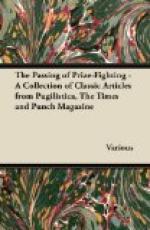[Illustration: “Then a strange thing happened.”]
My name is SMALLUN HALFBOY, a curious name for an old fellow like me, who have been battered and knocked about all over the world from Yorkshire to South Africa. I’m not much of a hand at writing, but, bless your heart, I know the Bab Ballads by heart, and I can tell you it’s no end of a joke quoting them everywhere, especially when you quote out of an entirely different book. I am not a brave man, but nobody ever was a surer shot with an Express longbow, and no one ever killed more Africans, men and elephants, than I have in my time. But I do love blood. I love it in regular rivers all over the place, with gashes and slashes and lopped heads and arms and legs rolling about everywhere. Black blood is the best variety; I mean the blood of black men, because nobody really cares twopence about them, and you can massacre several thousands of them in half-a-dozen lines and offend no single soul. And, after all, I am not certain that black men have any souls, so that makes things safe all round, as someone says in the Bab Ballads.
CHAPTER II.
I was staying with my old friend Sir HENRY HURTUS last winter at his ancestral home in Yorkshire. We had been shooting all day with indifferent results, and were returning home fagged and weary with our rifles over our shoulders. I ought to have mentioned that COODENT—of course, you remember Captain COODENT, R.N.—was of the party. Ever since he had found his legs so much admired by an appreciative public, he had worn a kilt without stockings, in order to show them. This, however, was not done from vanity, I think, but rather from a high sense of duty, for he felt that those who happened to be born with personal advantages ought not to be deterred by any sense of false modesty from gratifying the reading public by their display. Lord, how we had laughed to see him struggling through the clinging brambles in Sir HENRY’s coverts with his eye-glass in his eye and his Express at the trail. At every step his unfortunate legs had been more and more torn, until there was literally not a scrap of sound skin upon them anywhere. Even the beaters, a stolid lot, had roared when old VELVETEENS the second keeper had brought up to poor COODENT a lump of flesh from his right leg, which he had found sticking on a thorn-bush in the centre of the high covert. Suddenly Sir HENRY stopped and shaded his eyes with his hand anxiously. We all imitated him, though for my part, not being a sportsman, I had no notion what was up. “What’s the time of day, Sir HENRY?” I ventured to whisper. Sir HENRY never looked at me, but took out his massive gold Winchester repeater and consulted it in a low voice. “Four thirty,” I heard him say, “they are about due.” Suddenly there was a whirring noise in the distance. “Duck, duck!” shouted Sir HENRY, now thoroughly aroused. I immediately did so, ducked right down in fact, for I did not know what might be coming, and I am a very timid man. At that moment I heard a joint report from Sir HENRY and COODENT. It gave on the whole a very favourable view of the situation, and by its light I saw six fine mallard, four teal and three widgeon come hurtling down, as dead as so many door-nails, and much heavier on the top of my prostrate body.




